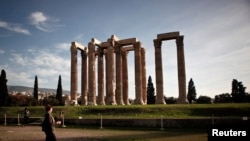Amid the sounds of buskers playing Greek folk music, thousands of tourists wander among the ruins of the Acropolis that looms over Athens – walking in the foundations of Western civilization.
Meanwhile, a short boat ride away lie hundreds of idyllic islands bathed in the Mediterranean sun. Between this and the rich and bountiful cuisine, it’s easy to see why Greece tops many vacationers’ wish lists, which churned out a record $15.1 billion in receipts last year.
Tourists are continuing to flock to Greece despite fears of looming economic catastrophe should a proposed bailout deal with international lenders collapse. And even though officials say this year's bookings are holding up well, they warn that some tax hikes proposed as part of the bailout could severely affect the industry.
WATCH: Greeks Fear Bailout Deal Could Threaten Tourism
“Tourism is more important in terms of GDP than industry and agriculture put together," said Alexander Lamnidis, general manager of the Greek Tourism Federation.
Despite the crisis, millions of tourists are currently visiting Greece, where tourism officials call their visitors vital to the country's economic recovery.
At the famed Acropolis in Athens, however, visitors seem oblivious to critical role they play, and most said they had experienced no problems.
“Many people discouraged us from coming," said one American woman who chose to withold here name. "We saw the news back in the U.S...and honestly it seemed a little overblown.”
“We are from Germany, and it’s no problem for us," said one man. "We had no fears to come to Greece.”
Among the tax increases proposed by lenders, however, is a rise in VAT to 23 percent. Greek islands would also lose their existing VAT discount.
“When the VAT in France is 10 percent, and it is between 8 and 10 percent in most of southern European countries including Turkey that is 8 percent - of course it is not an EU member," said Lamnidis. "Therefore all we say is that we have to be competitive. So 23 percent is huge.”
Constantine Michalos, president of the Athens Chamber of Commerce, says some of Europe’s demands would hamper economic growth.
“Our heavy industry in this country is tourism," he said. "So, what we need to do on both sides is to understand which are the structural reforms which are positive for the economy, sustainable by the Greek people, so that our partners can hope that at the end of the day, the dues from Greece will be paid in full.”
Apart from delays at some ATMs, officials say Greece is as peaceful as ever.
Locals say the best way to aid economic recovery is simple – visit Greece, enjoy all it has to offer, and spend plenty of euros.






